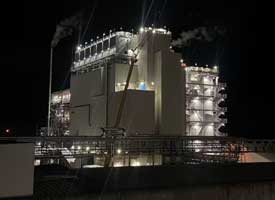Green materials: Eastman achieves on-spec output at US molecular recycling facility; Next Wave starts operations at ethylene-to-alkylate facility

US materials firm Eastman has announced it has achieved on-spec initial production and is generating revenue from its new molecular recycling facility in Kingsport, Tennessee. The company expects to ramp up production of the new facility over the coming months and enable growth across a wide range of markets. Achieving this critical milestone enables the company’s pathway to deliver approximately US$75 million of incremental EBITDA in 2024 from this facility as it builds momentum in its circular economy platform.
Eastman adds its proven polyester renewal technology recycles hard-to-recycle plastic waste bound for landfill or incineration today. The company’s technology allows this waste to be broken down into its molecular building blocks and then reassembled to become virgin-quality material without compromising performance.
Eastman says it is enabling the potentially infinite use of materials by keeping these valuable molecules in production, in a material-to-material high-yield loop. Eastman can transform waste plastic into virgin quality food contact polyesters with lower greenhouse gas emissions than traditional methods.
In addition to this recently completed facility in Kingsport, Eastman plans to invest in two additional molecular recycling plants, one in France and another US site.

Meanwhile, another US energy firm Next Wave Energy Partners, a portfolio company of Energy Capital Partners (ECP), also announced that its alkylate production facility, known as Project Traveler and located adjacent to the Houston Ship Channel in Pasadena, Texas, has achieved commercial operations.
“We are extremely pleased that this innovative facility is now producing what we believe to be the world’s highest quality alkylate product,” said Next Wave Executive Chairman Patrick Diamond. “Although the composition of global energy supplies will evolve over many years, Next Wave is firmly positioned to deliver drop-in solutions that improve energy efficiency and reliability and contribute to the decarbonisation of our planet both now and into the future.”
Alkylate is a valuable gasoline blending component that typically comprises 10% to 15% of the overall gasoline pool in the US. Alkylate is prized for its clean properties – high octane, low vapour pressure and low sulphur content.
Next Wave’s alkylate product, marketed under the trade name Optimate, offers qualities superior to traditional refinery alkylate because it can be produced with 96.0 road octane (98.0+ Research Octane Number), a low 3.5 Reid vapour pressure and five parts per million or less of sulphur. Importantly, Optimate, produced without using crude oil, has a lower carbon intensity than traditional refinery alkylate.
“The performance of our Project Traveler facility has exceeded our expectations and there is strong market demand for our lower carbon intensity Optimate product,” said Next Wave President/CEO Michael Bloesch. “The Next Wave platform – anchored by Project Traveler – is well positioned for cost-effective expansions of Optimate production capacity, while also retaining the optionality to vertically integrate into upstream renewable feedstocks and downstream renewable chemical and fuels products.”
In addition to commencing engineering work for debottlenecks of and capacity additions to the Project Traveler facility, Next Wave is also in the development stage for a second project.
The project, known as Project Lightning, would leverage the existing assets and enhance the optionality of the Next Wave platform by converting renewable feedstocks into chemical building blocks for use in the manufacturing of a variety of specialty products, from net zero carbon plastics to sustainable aviation fuel (SAF). Specifically, Project Lightning would utilise ethanol as a feedstock and have the capability to produce bio-ethylene, renewable Optimate (alkylate), and sustainable aviation fuel. The inclusion of a metathesis unit in the project would add optionality to convert ethylene and bio-ethylene into propylene and bio-propylene, respectively.
“I would like to thank the entire Next Wave team for their unwavering commitment to developing a world-class facility,” said Pete Labbat, Managing Partner at ECP. “ECP is proud to have partnered with Next Wave, a company that has been at the forefront of the US energy revolution. Next Wave remains committed to producing a product that enhances transportation fuel efficiency and doing so with adherence to safe and reliable operations.”
(PRA)SUBSCRIBE to Get the Latest Updates from PRA Click Here»




